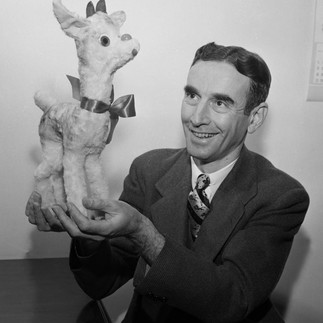A Glowing Legacy
- Maxwell Truth

- Dec 1, 2022
- 3 min read
When most people hear the name Rudolph the Red Nosed Reindeer, they envision the stop motion animation of the Rankin Bass TV special. But the story of the young reindeer being ostracized by his peers because of his 'blinkin beak' was legendary way before Burl Ives, as the snowman, told his version in 1964.

Nearly thirty years prior in 1938, a 34 year old ad writer named Bob May was working for retail giant Montgomery Ward in Chicago. He was facing some very difficult times as he dealt with personal financial struggles compounded by his wife's ongoing battle with terminal cancer. As a way of trying to comfort his four year old daughter Barbara after she asked him why her Mommy was different from others, he told her a bedtime story that contained elements of his own childhood recollections.

In his youth Bob was a small, sickly boy, who was constantly picked on and called names. But he wanted to give his daughter hope, and to show her that being different was nothing to be ashamed of. So he began telling her a story about a young reindeer who was outcast because of his bright red nose. His daughter loved the story so much she begged him to tell the tale again and again every night as he tucked her in. As he repeated the story he kept adding elements and characters to the tale which wound up taking form as a poem.

Alas Bobs financial struggles and his wife's illness prohibited him from being able to afford a gift for his little girl that year so he decided to create a homemade picture book from the poem he had written depicting the saga of the little reindeer that wound up saving Santa and his team on that stormy Christmas Eve.

Sadly in early December of 1938, Bob’s wife died. Nevertheless through his heartbreak, he kept working on the book. A few days before Christmas, he reluctantly attended a company party at Montgomery Ward. His co-workers encouraged him to share the poem that he had written. The response was overwhelming. Everyone wanted copies of their own. Montgomery Ward bought the rights to the story from their debt-ridden employee and over the next six years, at Christmas, they gave away six million copies of 'Rudolph the Red Nosed Reindeer' to their shoppers. Every major publishing house in the country made offers to obtain the book and in true Christmas spirit, the head of the department store returned all rights to Bob May. Over the next few years, Rudolph had turned him into a millionaire.

Eventually Bob remarried. His new brother-in-law, just happened to be a successful songwriter named Johnny Marks, who is without question one of the most important names in all of modern Christmas music having penned such mid century classics like Run Rudolph Run, Rockin Around The Christmas Tree and Holly Jolly Christmas. Johnny agreed to write the song based on the poems success and the animated film that was made by Max Fleischer Studios a year earlier.

The song was pitched to many artists including Bing Crosby but they all passed. Finally, Marks approached Gene Autry. The cowboy star had scored a holiday hit with “Here Comes Santa Claus” a few years earlier but sadly he wasn’t impressed with the song either. Marks begged him to give it a second listen. Autry then played it for his wife Ina, who was so touched by the line “They wouldn’t let poor Rudolph play in any reindeer games” that she insisted her husband record the tune.
Within a few years, it had become the second best-selling Christmas song ever, right behind “White Christmas.” The now famous song was added when the Fleischer film was re-issued by the Jam Handy Organization in 1951.
Since then, Rudolph has come to life not only on TV, but also in cartoons, movies, toys, games, coloring books, greeting cards, Christmas ornaments and has become part of Christmas lore to millions around the world.
There is no question that the little red-nosed reindeer conjured up by Bob May and immortalized in song by Johnny Marks has become as much a part of the holiday season as Santa himself, In fact you could even say “He’ll go down in history.”
click here to watch the original Max Fleischer animated film












Comments